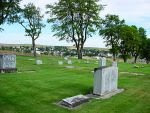

'Tis said that towards the end of our life we take a renewed interest in obituaries and in tending our ancestral graves. Prompted by some such morbid inclination, I've been going over the list of the names of the 701 souls interred in the "Lamont" town cemetery--A small enough number, but huge considering that I recognize, and can put a face to nearly a quarter or a third of all the names.
Saddest and bitterest, him whom I last remember at twelve years of age, standing naked with me and my brother, aged eleven and thirteen, in a tepid waterfall of Willow Creek, a mile or so downstream from my grandfather's farm at Pampa, under a brilliant end-of-June sun--a brilliant, quizzical, laughing boy, the spitting image of his sharp, quizzical father, Frank Gordon: "Gordon, Timothy T, 'Tim' 1944 - 1965." I had heard that he'd drowned in a boating-accident, while fishing in Alaska. I envision Frank spelling out the inscription--with its little joke, typical dad-humour, just between themselves--"That's 'T' for nothing, 'T' for Timothy, my son Tim."
But how many in this world, even in the ancestor-worshipping East, can point to a corner of the earth where the remains of so many of his kith and kin are buried, as I can in the 'Lamont' "perpetual care" cemetery? There are both of my parents, my older brother (who died in childbirth a year before I was born), all four of my grandparents, and even a great-grandfather and great-grandmother (my mother's mother's father and mother)--and many, many cousins, aunts, uncles, second and third cousins, and not a few great-aunts and uncles. Was I, am I, the nexus of so many lives? I feel like a one man road-show of Our Town.
Speaking of great-grandparents, I had been looking all over for the graves of my great-grandfather and great-grandmother Moses and Ellen Moore--I had assumed they must have been buried near Dayton, because that's where they settled, and where, when I was a boy, we would travel to visit their many children and grand-children...but Lo! here they are in the 'Lamont' cemetery, together with most of their progeny. But now a mystery arises: According to the stories my grandmother told me, her father and mother had fled from what is now West Virginia just before the Civil War. But if they did, they could not have been older than seventeen or eighteen, and nine, years old, respectively. The Civil War began in April, 1861; and according to the dates on the gravestones, Moses Moore was born in 1843, his wife Ellen in 1852. Another, indistinct-as-to-source memory tells me that Great-grandmother Ellen Moore was thirteen when she married Moses (he being a cradle-robbing twenty-four or twenty-five years old)--1865. So, they "fled" most likely just after the Civil War ended. This puts a whole new complexion on their status as war refugees. I've seen the tax record for Moses Moore in 1866 or 1867 in the Washington Territory; he was assessed at (as I recall) some $1,250 worth of property; which might have been $18,000 in modern money, or it might have been ten times that. At any rate, he was not poor--not nearly so poor as a man fleeing the devastation of war, who had just put all his assets into a wagon train, should have been.
And the important, the valuable, the precious thing about great-grandfather Moses Moore was that he didn't act poor. Several different things that I know about him confirm this:
item -- related by my mother: "He and his family were hospitable to a agree unknown and unheard of in those days, in this part of the world. Whenever a caller or a visitor appeared, whatever work was being done--even field-work--would be abandoned, tools thrown down, while the visitor was greeted and 'entertained.' People came to spend the night, and wound up staying for weeks. And when a caller departed, Grandfather Moses would invariably walk with them clear to the end of the lane [rural Westernism for drive-way]."

 'Tis said that towards the end of our life we take a renewed interest in obituaries and in tending our ancestral graves. Prompted by some such morbid inclination, I've been going over the list of the names of the 701 souls interred in the "Lamont" town cemetery--A small enough number, but huge considering that I recognize, and can put a face to nearly a quarter or a third of all the names.
'Tis said that towards the end of our life we take a renewed interest in obituaries and in tending our ancestral graves. Prompted by some such morbid inclination, I've been going over the list of the names of the 701 souls interred in the "Lamont" town cemetery--A small enough number, but huge considering that I recognize, and can put a face to nearly a quarter or a third of all the names. 

0 Comments:
Post a Comment
Note: Only a member of this blog may post a comment.
Subscribe to Post Comments [Atom]
<< Home